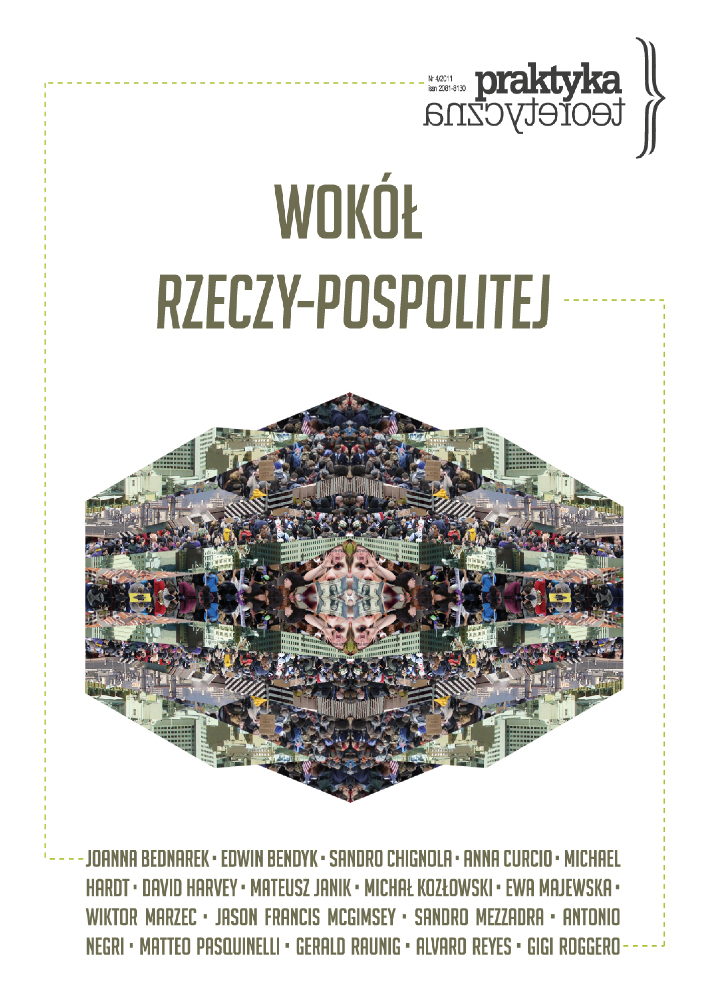Abstract
Discourse Theory is a heterogeneous ensemble of approaches, which have recently brought some refreshment in the social and political sciences. Although it offers a kind of social ontology based on post-structuralist approach towards language and discourse, it does not provide with a given methodology, ready to use in empirical research. Hitherto prevailing researches have rather looked for empirical exemplifications of the assumed theory, than made their referential strategy clear and convincing. Therefore, an effort of supplementing the theoretical and methodological matrix with some definite research techniques, seems substantial. A more empirically oriented discourse research approaches as Critical Discourse Analysis or even lexicometrical research can be here of a great value. Although a significant differences in ontological assumptions can be observed, a combined research strategies, enabling well proved empirical research appear not impossible to work out and successfully utilise.References
Charmaz K. 2009. Teoria ugruntowana: praktyczny przewodnik po analizie jakościowej. Warszawa: Wydawnictwo Naukowe PWN.
Fairclough N. 2001. Critical Discourse Analysis as a Method in Social Scientific Research. W Methods of Critical Discourse Analysis. London-New Delhi: Sage.
Fairclough N., A. Duszak. 2008. Wstęp: krytyczna analiza dyskursu – nowy obszar badawczy. W Krytyczna analiza dyskursu: interdyscyplinarne podejście do komunikacji społecznej. Kraków: Universitas.
Fairclough N., R. Wodak 2004. Critical Discourse Analysis. W Social Research Methods: A Reader. London-New York: Routledge.
Foucault M. 2002. Porządek dyskursu. Gdańsk: Słowo/obraz terytoria.
Foucault M. 1977. Archeologia wiedzy. Warszawa: Wydawnictwo Naukowe PWN.
Frank T. 2008. Co z tym Kansas: czyli opowieść o tym. jak konserwatyści zdobyli serce Ameryki. Warszawa: Wydawnictwo Krytyki Politycznej.
Glasche G. 2007. „Vorschläge zur Operationalisierung der Diskurstheorie von Laclau und Mouffe in einer Triangulation von lexikometrischen und interpretativen Methoden”. Forum: Qualitative Sozialforschung 8(2). http://nbn-resolving.de/urn:nbn:de:0114-fqs0702143
Glynos J., Howarth D. 2007. Logics of Critical Explanation in Social and Political Theory. New York: Routledge.
Griggs S., D. Howarth. 2006. „Metaphor. Catachresis and Equivalence: the Rhetoric of Freedom to Fly in the Struggle over Aviation Policy in the UK”. Policy and Society 25 (2) : 23-46.
Griggs S., D. Howarth. 2008. “Populism. Localism and Environmental Politics: the Logic and Rhetoric of the Stop Stansted Expansion Campaign”. Planning Theory 7 (2) : 123-144.
Hardt-Mautner G. 2011. “Only Connect.”: Critical Discourse Analysis and Corpus Linguistics. http://ucrel.lancs.ac.uk/papers/techpaper/vol6.pdf.
Howarth D. 2008. Dyskurs. Warszawa: Oficyna Naukowa.
Howarth D. 2004. Applying Discourse Theory: the Method of Articulation. W Discourse Theory in European Politics. London: Palgrave Macmillan.
Jørgensen M., L. Phillips. 2002. Discourse Analysis as Theory and Method. London-New Delhi: Sage.
Konecki K. 2009. Wstęp. W Odkrywanie teorii ugruntowanej. Warszawa: Nomos.
Laclau E. 2009. Rozum populistyczny. Wrocław: Wydawnictwo Naukowe Dolnośląskiej Szkoły Wyższej.
Laclau E., Ch. Mouffe. 2007. Hegemonia i socjalistyczna strategia: przyczynek do projektu radykalnej polityki demokratycznej. Wrocław: Wydawnictwo Naukowe Dolnośląskiej Szkoły Wyższej.
Lasch Ch. 2007. Bunt elit. Kraków: PLATAN.
Leeuwen T. 2008. Discourse and Practice: New Tools for Critical Discourse Analysis. Oxford: Oxford University Press.
Marchart O. 2007. Post-Foundational Political Thought: Political Difference in Nancy. Lefort. Badiou and Laclau. Edinburgh: Edinburgh University Press.
Rapley T. 2010. Analiza konwersacji. dyskursu i dokumentów. Warszawa: Wydawnictwo Naukowe PWN.
Saussure F. 1991. Kurs językoznawstwa ogólnego. Warszawa: Wydawnictwo Naukowe PWN.
Sørensen E., J. Torfing. 2008. Theories of Democratic Network Governance. New York: Palgrave Macmillan.
Torfing J. 2005. Discourse Theory: Achievements. Arguments. and Challenges. W Discourse Theory in European Politics Identity. Policy and Governance. New York: Palgrave Macmillan.
License
“Theoretical Practice” seeks to put into practice the idea of open access to knowledge and broadening the domain of the commons. It serves the development of science, thinking and critical reflection. The journal is published in open-access mode under the CC-BY-NC-SA 4.0 license (detail available here: http://creativecommons.org/licenses/by-nc-sa/4.0/). Articles published in the journal may be freely distributed, stored, printed and utilized for academic and teaching purposes without restrictions.
They should not be, however, used for any commercial purposes or be reconstructed into derivative creations. Access to the journal may not be limited or offered for a fee by any third party.
Prospective authors are obliged to fill in, sign and send back the publishing contract compliant with the CC licencing. [PL.pdf, PL.doc, EN.pdf,EN.doc].
According to this contract, authors grant the journal a non-exclusive right to publish their work under the creative commons license (CC-BY-NC-SA 4.0) without any financial obligation on both sides of the contract.
Before submission authors should make sure that derivative materials they use are not protected by copyright preventing their non-commercial publication. Authors are responsible for any respective copyright violations.
